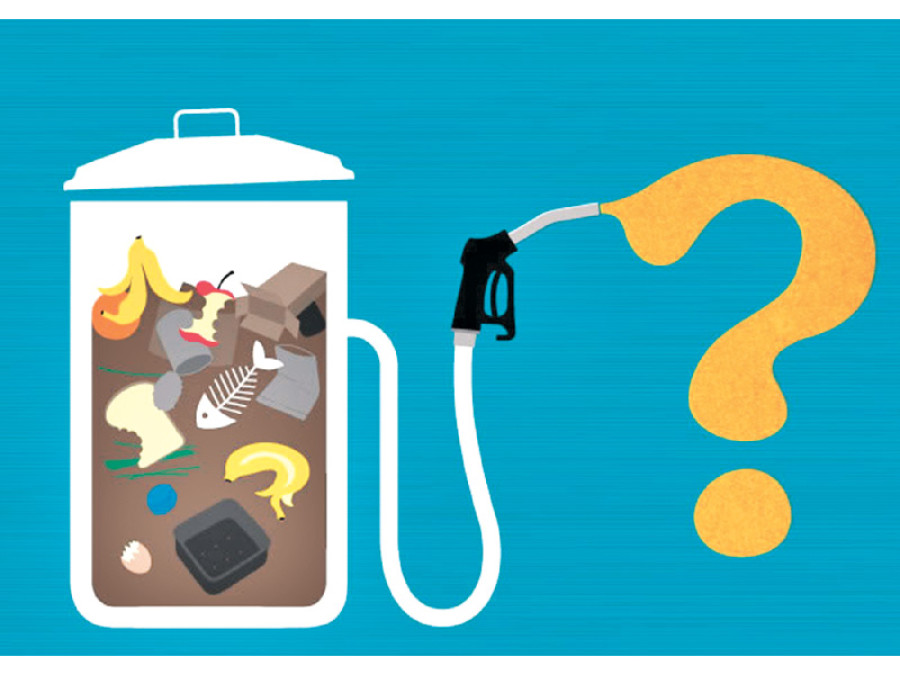Opinion
A price worth paying
Nepal has the potential to produce biofuels and become energy independent
Sudiksha Joshi & Sushil Adhikari
The ongoing unofficial blockade by India has exposed Nepal’s vulnerability, particularly in meeting its ‘thirst for oil’. According to Nepal Energy Forum, petroleum products account for nearly one-fifth of the nation’s total imports, and the cost of importing them far exceeds the total earnings through exports. Being a fuel importing and landlocked country is a double disadvantage; it has been evident with two blockades in the past 25 years,
multiple price hikes and instances of fuel shortages. However, little has been done towards addressing this issue. For many years, we have been told that Nepal has a huge potential for generating electricity through hydropower, but it remains unexploited. We can envision Nepal meeting its energy consumption needs through electricity. Yet, the need for liquid transportation fuels such as petrol, diesel, or jet fuels will still remain.
Diesel substitution
Technological advances have made the production and the consumption of alternative fuels a viable substitute of petroleum products. So it is crucial for Nepal to implement alternative fuels production programmes vigorously to ensure that the country does not cripple under such constant blockades. The production of alternative fuels creates ‘green jobs’, increases spending in the local economy (which would otherwise go to foreign countries), and lowers greenhouse gas emissions. Resourcefulness is going to be the key in making Nepal less dependent on foreign oil, to boost economic growth, generate employment opportunities, drive innovations, and perhaps allow it to take its decisions more independently.
Nepal imports about 1.2 billion litres of petrol and diesel annually, of which approximately 920 million litres is diesel according to the Nepal Oil Corporation. With an average price of Rs 100 per litre of diesel, Nepal spends Rs 92 billion ($920 million) every year for importing diesel alone. Most of the Nepalis are highly dependent on diesel because the majority of the public transportation vehicles operate on it. And many cannot afford private vehicles which primarily run on petrol. So, the production of a diesel substitute holds the most promise in the context of Nepal. The production of renewable liquid transportation fuels could meet the demands for diesel in the country, and it has been found to be technically feasible too.
Presently, in South Africa, 150,000 barrels or nearly 24,000 kilolitres of synthetic petrol and diesel is produced every day from coal, which meets almost 28 percent of South Africa’s annual fuel needs. This has become possible because of a well-known process called the Fischer-Tropsch synthesis (FTS). Franz Fischer and Hans Tropsch first developed the process in Germany in 1925. Petroleum products (petrol, kerosene, and diesel) are basically liquid hydrocarbons, and this process has allowed the use of carbon sources like coal, natural gas, or biomass including municipal solid wastes to produce renewable transportation fuels. The carbon sources are first converted to syngas or synthesis gas—a mixture of carbon monoxide and hydrogen—which can then be
converted to diesel fuels via FTS. Another viable alternative is the cultivation and the use of algae, commonly known as ‘leu’, to produce biodiesel.
Waste to fuel
A number of universities in the US and other countries are producing hydrocarbons from biomass. Researchers at Auburn University in Alabama the US are converting pine (salla) to diesel, petrol, and jet fuels. The concept of biofuel is not entirely new to Nepal. The country has been implementing the National Biofuel Programme since 2008 with a particular focus on the cultivation of Jatropha or ‘sajjiwan’ to use Jatropha oil to produce biodiesel. However, large-scale production of Jatropha has been found to be an economically unviable option. The Water and Energy Commission Secretariat estimates Nepal’s total biomass to be 873 million tonnes with a national biomass balance in deficit. With agricultural and forest lands already constrained, using land-based plants as a source of large-scale production of biofuels will not be a feasible option in Nepal. But the use of municipal solid wastes and algae does fit the bill. In many cities across Nepal, sewage ends up in what it once used to be pristine and holy rivers. A common example is the Bagmati River. Kathmandu metropolitan city alone generates almost one-third of the country’s total solid waste, which is 466.14 tonnes per day or 170,000 tonnes per year according to the Asian Development Bank. The solid waste produced in Kathmandu and across Nepal, in general, is primarily organic waste and paper products, ready to be converted to syngas and then to biodiesel. Algae, the other alternative, grow faster than trees and other crops and are readily available. Algae have the potential to produce large amounts of oil and carbohydrates that can then be converted into diesel while cleaning the city’s wastewater at the same time. Cultivating algae also has the added benefit of trapping carbon dioxide from the atmosphere. Auburn University’s researchers including a Nepali graduate student are currently converting algae to diesel fuel.
Time to act
Based on Nepal’s current diesel demand of 920 million litres, it needs around 12 plants each with a production capacity of 75 million litres of diesel will be required. Each plant will cost around $300 million, and with the money that the country spends in importing diesel fuel each year, it could build three plants. With the money spent on importing oil for four to five years, the government could build plants that will be sufficient for providing diesel fuel to the entire country. Though the initial investment cost is high but there is plenty of scope for it. However, if Nepal is to become competitive in today’s world and thrive with this informed and truly connected generation of Nepalis then, energy independence or rather reduced dependency is a must. Nepal just needs the will and a long-term collaboration, cooperation, coordination, and commitment to reciprocate the will into action.
Joshi has a doctoral degree in natural resource economics from West Virginia University, the US; Adhikari is an alumni associate professor in the Biosystems Engineering Department at Auburn University, the US




 9.12°C Kathmandu
9.12°C Kathmandu










